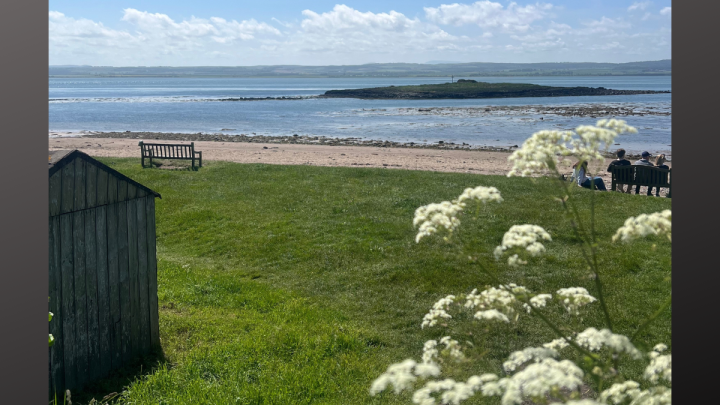Dear Friends,
Grace and peace to you in the name of Jesus Christ. I give thanks for you each time I go to God in prayer. You all are striving for excellent ministry and mission in every place! You are overcoming obstacles and placing God’s love in the midst of difficult situations. Thanks be to God for the care and concern you offer, for loving God and neighbor right where you are.
I am grateful for the prayers and well-wishes I received as I headed out to Scotland and Northumbria (England) in May and early June. I am truly grateful for that time to walk, to be quiet, to know God, and to hear God’s voice. The trip was not an easy one: it rained every day of this adventure – and the ground was saturated with water already from heavy rains the week before. The people of Scotland, however, are not afraid of mud, so we tried to follow suit. We embarked each day in layers and walked into the 45-degree mornings with great hope for some hint of sun and whatever the day would bring. We climbed steep hills and fjorded a few streams.
The Holy Island of Lindisfarne, where our walk ended, is situated off the coast of northern England by the North Sea. It seemed to call one to prayer. St. Cuthbert used to stand in the water, and the seals and otters would gather around. He was known to commune with these creatures, to speak to them, and they would surround him with warmth and accompany his prayers. He was a human, deeply connected to God, who was called to this place and to serving the people.

The lectionary passage in Ezekiel for July 7 is chapter 2, verses 1 through 5. We find Ezekiel being sent out as a Mortal, one who is definitely human, by God. His message is to go and speak to impudent and stubborn Israelites, rebels who have transgressed against God. God tells him something like: You, weak and lowly human, go with the strong message of “Thus says the Lord.”
As Christians, we seek to have God-encounters; but perhaps this is not exactly what WE are looking for. We want to hear from God, to know God. This God-encounter is at the root of our worship experiences.
And we must know that an encounter with God may knock us off our feet; only when God gives us strength/knowledge/courage may we have the ability to respond. Case in point: this encounter results in a call to Ezekiel to say what God tells him to say; even as a Mortal, he must speak for God. And, God says, the people are not likely to receive this message well, as impudent and stubborn ones! Our human selves are often not ready for God though we long to know God’s word for us and to us. A call from God is the best and the worst – held in tension.
I’m reminded by Connors in Feasting on the Word that collected humans – the church – “stand[s] in at least two places in this text: as proclaimer and as receiver of proclamation. . . this text gives courage to a church already limping from its myriad wounds” as proclaimer. God is sending out one who is mortal, hardly able to move with a most difficult message. “Thus says the Lord” is all Ezekiel, and we, need to know. The Church is sent to offer God’s message, whether or not the people hear. The proclaimer is focused on delivering the message and not so much worrying about whether or not it was received or the results it produces. If we are like Ezekiel . . .
This may be hard to hear, my preacher and lay friends. We are definitely focused on numbers, measurements, and statistics. From day one, each of us is measured, so we can be tracked on growth charts for healthy outcomes, doctors say. We count and compare results throughout the rest of our lives – for self, for personal, for professional outcomes. As pastors and leaders, we are constantly focused on the take-home message, the outcomes, and the best metaphors to help apply the message. We look for stories to touch a heart. For Ezekiel, what matters is not the outcome, but faithfully saying what God tells him to say. What if we, like Ezekiel, focused on planting the seeds and left the harvest to God? What if we focused on God’s call upon our lives and seek to faithfully live that out?
And then there’s this other role of the church to consider: while we often proclaim, we are also the ones in need of the Word, proclaimed and heard. We are the stubborn ones who don’t always want to listen to what God is saying. God sends not only a message but messengers, ones who are not in a pulpit on Sunday morning. God sends everyday Mortals out to offer a message; non-preachers in plain clothes but messengers nonetheless. These messengers show up in our midst and share their story, which is God’s story and message to us. They show up to remind us to love, care, compassion, laugh, cry, be hope-filled, and deeply saddened for the world around us.
The story goes that a young man heard at home, “You’re not good enough.” And when he went to school, he heard, “You’re not smart enough for those classes.” And eventually, he turns to the church, the preacher, to ask, “Does the church care about people like me?” And the pastor has to wipe away a tear. And the pastor must pause realizing what this young person is needing; and what his is saying. The young man has brought a message from God, powerfully delivered: “Thus says the Lord.” This is a God encounter where we are disrupted and sustained by the word of God embodied in the lives of mortal, real people.
I had a God encounter on the Holy Island and received God’s word powerfully and beautifully shared; it was more than one encounter. I stepped into holy spaces that spoke deeply to my spirit. I was disrupted, too. And I have come home ready to respond in my limited, Mortal way. May you encounter God—with you as the proclaimer with a message and you as the receiver of the message.
May it be so. Tara
Tara
photos taken by Rev. Tara Lain

